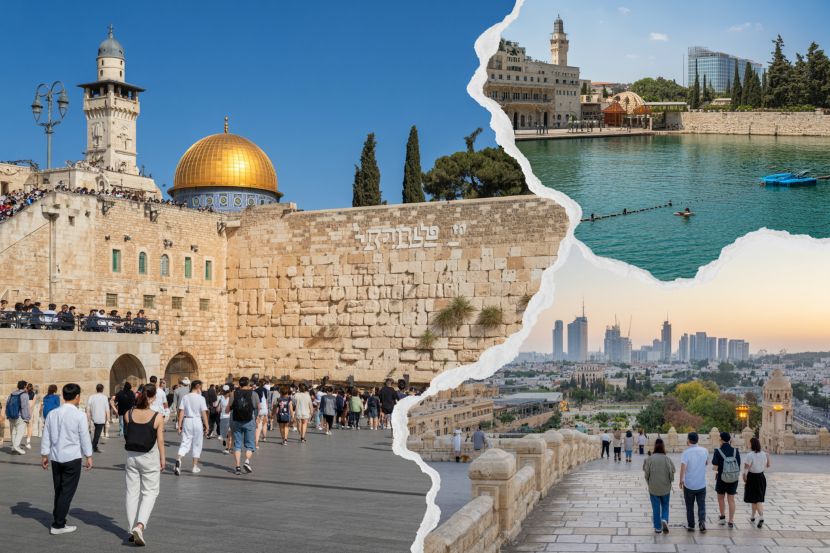Published on
November 14, 2025
In recent years, Israel has started turning its tourism focus towards East Asia, capitalizing on growing interest from countries like China, South Korea, and the Philippines. A comprehensive survey conducted by Israel’s Tourism Ministry has revealed significant growth in the number of East Asian travelers expressing interest in Israel. The survey, which reached 12,000 high-income individuals across China, South Korea, and the Philippines, shows that nearly half of Chinese respondents are keen to visit Israel in the near future. With these results, Israel is adjusting its marketing strategies, focusing on attracting tourists from these booming East Asian markets.
East Asian Market: A Key Growth Area for Israel’s Tourism
Israel’s Tourism Ministry has identified a promising shift in travel trends, particularly among high-income travelers from East Asia. The results of a July 2025 survey targeted at individuals with valid passports aged 25 and older, who were financially well-positioned, demonstrate a notable appetite for international travel to Israel from these regions. Specifically, the survey showed that 49% of Chinese travelers were inclined to visit Israel, while 34% of Korean respondents echoed this sentiment. The Philippines, too, is showing positive signs of growth in this area.
This growing interest signals a major opportunity for Israel, which has traditionally catered to Western and European tourists. As the number of travelers from these Asian nations increases, Israel is pivoting its tourism marketing strategy, working to highlight its rich cultural heritage, historical landmarks, and diverse experiences to potential travelers in these countries.
Why East Asia Matters for Israel’s Tourism Industry
The pivot towards East Asia isn’t just about numbers—there’s a significant cultural and economic shift happening in the travel industry. As incomes rise in countries like China and South Korea, a new wave of travelers is emerging who are willing to spend on international tourism. These travelers are becoming more sophisticated in their choices, seeking unique, off-the-beaten-path experiences. For Israel, a country with ancient sites and religious significance, this is a golden opportunity to showcase its diverse tourism offerings beyond the usual pilgrimage-based tourism.
The Chinese market, in particular, presents an exciting opportunity for Israel. Over the past decade, the number of Chinese tourists traveling abroad has soared, and Israel is increasingly seen as a top destination. Korean tourists, known for their interest in history and culture, are also responding positively to Israel’s historical narrative and modern attractions. Meanwhile, the Philippines‘ growing middle class represents a new source of travel demand.
Tourism in Israel: What Can Travelers Expect?
For those from East Asia considering a trip to Israel, the country offers a wealth of attractions that are sure to appeal to diverse interests. History buffs will find themselves captivated by Jerusalem’s Old City, a UNESCO World Heritage site that includes the Western Wall, the Church of the Holy Sepulchre, and the Al-Aqsa Mosque. For those more drawn to nature and relaxation, the Dead Sea offers a unique floating experience, while the desert landscapes around Eilat are perfect for adventurous travelers.
Furthermore, Israel is home to Tel Aviv, a modern city known for its vibrant nightlife, cutting-edge art scene, and Mediterranean beaches. Travelers can experience a unique fusion of ancient traditions and modern culture that Israel so effortlessly combines. For food enthusiasts, Israel’s diverse culinary scene, influenced by Middle Eastern, Mediterranean, and Jewish traditions, offers a truly tantalizing experience.
Tourism Tips for East Asian Visitors to Israel
If you’re planning a trip to Israel, there are several travel tips that can help you make the most of your visit. Here are a few suggestions for East Asian travelers:
Respect the local culture: Israel is home to a diverse population, including Jews, Muslims, and Christians, and cultural sensitivity is key. It’s important to be respectful of religious practices, especially when visiting sacred sites.Plan for diverse weather: Israel’s climate can vary dramatically depending on where you are. While Tel Aviv and the coastal areas enjoy mild Mediterranean temperatures, the Negev Desert can be extremely hot, especially in summer.Public transportation: Israel’s public transport system is efficient, but certain areas may require private transport, especially when traveling to more remote historical sites like Masada or Nazareth.Try the local food: Israeli cuisine is a mix of flavors from the Middle East and Mediterranean, with hummus, falafel, and shawarma being popular staples. Make sure to sample fresh produce at the shuks (markets) in Jerusalem and Tel Aviv.Security awareness: Like many international destinations, Israel has a heightened focus on security, particularly in areas with high tourist traffic. While travel in Israel is generally safe, it’s always good to stay informed about the current situation.Israel Tourism Strategy: The Road Ahead
Israel’s tourism authorities are already engaging with travel agencies and industry partners in countries like South Korea, China, and the Philippines to implement a robust marketing strategy. As part of this shift, Israel is focusing on increasing its presence at travel expos, launching targeted ad campaigns, and strengthening its travel partnerships. With these efforts, Israel aims to increase the influx of travelers from East Asia, driving growth in the tourism sector and boosting its global standing as a top-tier destination.
What’s Next for Israeli Tourism?
Israel’s tourism industry is entering a transformative phase, with its eyes firmly set on East Asia. As the country’s tourism efforts pivot toward the Chinese, Korean, and Filipino markets, Israel looks to diversify its tourism base and expand its reach. With significant interest already building in these regions, Israel’s challenge will be to ensure that its tourism infrastructure, experiences, and marketing are all aligned with the expectations of these new travelers.
